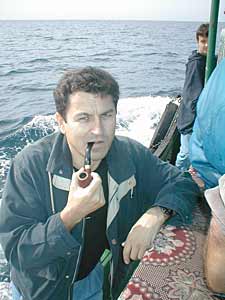
Working to discern patterns of environmental disinformation in an online world
For the past eight years, disinformation has dominated news around elections all over the world. Despite this, it is still a widely misunderstood con...
News

Publish date: February 18, 2002
Written by: Jon Gauslaa
News
International Helsinki Federation:
– The Pasko-conviction is a part of a "spy mania" spreading throughout Russia, the executive director of the International Helsinki Federation (IHF), Aaron Rhodes, said at a news conference in Moscow last Friday.
A number of violations
Rhodes said that the proceedings against and conviction of Pasko violate a number of the provisions of the European Convention on Human Rights (ECHR). Russia has ratified the Convention and the rules of the ECHR shall according to Article 15 (4) of the Russian Constitution apply if they contradict the rules of internal legislation.
In an open letter to the chairman of the Russian Supreme Court, Vyacheslav Lebedev, the IHF points out that the conviction violates Pasko’s right to a fair trial under Article 6 of the ECHR.
Pasko was tried by a military court, which hardly can live up to the standards for an "independent and impartial tribunal" set by Article 6. Moreover, the proceedings have been going on for more than four years, and the determination of the case may still lie well into the future. Thus, also Pasko’s right to have the charges against him determined within a reasonable time has been violated, says the IHF.
As far as the respected human rights organisation is concerned, the conviction also violates ECHR article 7 since it is based on two secret Ministry of Defence decrees; as well as Pasko’s rights to freedom of expression under Article 10 of the Convention.
A closed country once again?
At the news conference, Rhodes said that the letter on the Pasko case written by the IHF had been sent to 1,500 addresses in many countries. He named academician Igor Sutyagin and former diplomat Valentin Moyseev, as other victims of the spy mania. More information on their cases are available in IHF’s press release.
IHF President and head of the Moscow Helsinki Group, Lyudmila Alexeyeva, said that the spy mania should not only alarm Russian citizens. – Unless the spy mania is cut short, Russia’s business and academic contacts with foreign countries will be curtailed. We may again become the population of a closed country, she said.
*****
Grigory Pasko was arrested on November 20, 1997. He was acquitted by the Pacific Fleet Court in Vladivostok of treason through espionage on July 20, 1999, but sentenced to a three-year imprisonment for misusing his position and released on a general amnesty. Both sides appealed the verdict. In November 2000 the Military Supreme Court cancelled the verdict, and sent the case back for a new trial at the Pacific Fleet Court. The re-trial started on July 11, 2001 and ended on December 25, with Pasko being convicted to four years of hard labour for treason and taken into custody. The verdict is appealed again by both sides.

For the past eight years, disinformation has dominated news around elections all over the world. Despite this, it is still a widely misunderstood con...

A ruling by the European Free Trade Association Court that Norway’s continental shelf falls under the European Economic Area Agreement could dramatic...

Bellona held a seminar on countering Russian disinformation in the Arctic at the Arctic Frontiers international conference in Norway

Our December Nuclear Digest, reported by Bellona’s Environmental Transparency Center, is out now. Here’s a quick taste of three nuclear issues arisin...